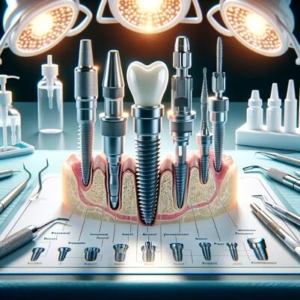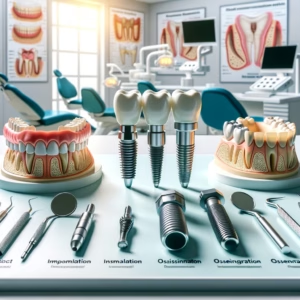Understanding Dental Implants
Dental implants have revolutionized the field of dentistry, offering a reliable and durable solution for individuals experiencing tooth loss. This section aims to provide a comprehensive overview of dental implants, covering their definition, function, and the various types available for adults.
What Are Dental Implants?
Dental implants are titanium posts surgically inserted into the jawbone to serve as artificial tooth roots. They provide a stable foundation for replacement teeth, which can be crowns, bridges, or dentures. Unlike traditional dentures or bridges, implants fuse with the jawbone, offering a level of permanence and stability that mimics natural teeth.
Key Components of a Dental Implant:
- Implant Fixture: The titanium post that is embedded in the jawbone.
- Abutment: A connector placed on top of the implant fixture to hold the replacement tooth.
- Prosthesis: The visible part of the implant, which can be a crown, bridge, or denture.
How Do Dental Implants Function?
Dental implants work through a process called osseointegration, where the titanium post integrates with the jawbone, providing a strong and stable base for the replacement tooth. This process involves several key steps:
- Initial Consultation: A dental professional evaluates the patient’s oral health and determines if they are a suitable candidate for implants.
- Surgical Placement: The implant fixture is surgically placed into the jawbone under local anesthesia, typically requiring a healing period of several weeks to months.
- Osseointegration: During the healing phase, the bone grows around the implant, securing it in place.
- Abutment Placement: Once osseointegration is complete, an abutment is attached to the implant.
- Prosthesis Placement: Finally, a custom-made prosthesis (crown, bridge, or denture) is affixed to the abutment, completing the restoration.
Types of Dental Implants
There are several types of dental implants available, each suited to different needs and circumstances:
- Endosteal Implants: The most common type, these implants are placed directly into the jawbone. They can support single crowns, multiple crowns, or full dentures.
- Subperiosteal Implants: Used for patients who do not have enough healthy jawbone to support endosteal implants. A metal framework is placed on the jawbone beneath the gum tissue, with posts protruding through the gums to hold the prosthesis.
- Zygomatic Implants: A specialized type of implant used when there is severe bone loss in the upper jaw. These implants are anchored in the zygomatic bone (cheekbone) rather than the upper jaw.
- Mini Implants: Smaller in diameter than traditional implants, mini implants are used for less invasive procedures, often for stabilizing lower dentures.
- All-on-4® Implants: A popular solution for patients needing full-arch restorations. This technique uses four strategically placed implants to support a complete set of teeth, often within a single day.
Benefits of Dental Implants
- Natural Appearance: Implants closely mimic the look and feel of natural teeth.
- Durability: With proper care, dental implants can last many years, often a lifetime.
- Bone Preservation: Implants help maintain jawbone structure, preventing bone loss that can occur with missing teeth.
- Improved Functionality: Patients enjoy enhanced chewing ability and speech qualities compared to traditional dentures.
Conclusion
Dental implants offer a comprehensive solution for tooth replacement, combining functionality with aesthetics. By understanding the types and processes involved, individuals can make informed decisions about their dental health. For those considering dental implants, a consultation with a qualified dental professional is essential to determine the best options tailored to their needs. Whether restoring a single tooth or an entire arch, dental implants provide a path to renewed confidence and quality of life.
The Process of Getting Implants
Obtaining dental implants involves a detailed and structured process to ensure the best outcomes for patients. Understanding each step can help potential candidates prepare for their journey toward restoring their smiles. Here’s a step-by-step breakdown of the process involved in getting dental implants.
Step 1: Initial Consultation
The journey begins with an initial consultation with a dental professional specializing in implant dentistry. During this appointment, the following will occur:
- Comprehensive Evaluation: The dentist will assess your oral health, reviewing your medical history and performing an examination, including X-rays or 3D imaging to evaluate bone density and the condition of surrounding teeth.
- Discussion of Options: After the evaluation, the dentist will discuss your suitability for implants, including potential treatment plans tailored to your needs, such as the type of implant most appropriate for you (endosteal, subperiosteal, etc.).
- Pre-Treatment Preparation: If necessary, additional treatments may be recommended, such as bone grafting to augment the jawbone if there is insufficient bone to support the implants.
Step 2: Surgical Placement
Once deemed a suitable candidate, the next step is the surgical placement of the implant:
- Anesthesia: The procedure is typically performed under local anesthesia, but sedation options may be available to ensure comfort.
- Implant Insertion: The dentist will create an incision in the gum to expose the jawbone and then drill a small hole into the bone to insert the titanium implant fixture.
- Closure: After the implant is placed, the gum tissue is stitched back to promote healing.
Step 3: Osseointegration
Following the surgical placement, a healing period is necessary for osseointegration to occur:
- Healing Time: This phase usually lasts several weeks to months, during which the bone grows around the implant, securely anchoring it in place.
- Follow-Up Appointments: Regular follow-up visits may be scheduled to monitor the healing process and ensure there are no complications.
Step 4: Abutment Placement
After successful osseointegration, the next step is to place the abutment:
- Second Surgery: A minor surgical procedure is performed to expose the implant and attach the abutment, which serves as a connector between the implant and the prosthesis.
- Healing of Gums: Following abutment placement, the gums will need time to heal, typically lasting a couple of weeks.
Step 5: Prosthesis Placement
Once the gums have healed, the final step is the placement of the prosthesis:
- Custom Creation: The dentist will take impressions of your mouth to create a custom prosthesis (crown, bridge, or denture) that matches your natural teeth.
- Attachment: The custom prosthesis is then securely affixed to the abutment, completing the restoration process.
Step 6: Follow-Up Care
After the prosthesis is in place, follow-up care is crucial for long-term success:
- Regular Dental Check-Ups: Schedule regular visits with your dentist for maintenance and monitoring the health of your implants.
- Oral Hygiene: Maintain excellent oral hygiene practices, including brushing and flossing, to ensure the longevity of your implants.
- Lifestyle Adjustments: Avoid habits that can jeopardize your implants, such as smoking or excessive alcohol consumption.
Important Tips for Potential Patients in Ashburn, VA:
- Research Providers: Look for qualified dental professionals with specific training in implant dentistry for the best outcomes.
- Insurance and Financing: Inquire about costs, insurance coverage, and financing options available to manage expenses related to dental implants.
- Prepare for Recovery: Follow pre-surgical instructions provided by your dentist, and arrange for post-surgical assistance if needed, to ensure a smooth recovery process.
By understanding each step involved in obtaining dental implants, patients can approach their treatment with confidence and clarity, leading to successful outcomes and improved oral health.
Benefits of Dental Implants
- Natural Appearance: One of the most significant advantages of dental implants is their ability to closely mimic the look and feel of natural teeth. They are custom-designed to match the color, shape, and size of your existing teeth, making it difficult for others to notice that you have had dental work done.
- Durability: Dental implants are designed to be a long-term solution for tooth loss. With proper care, they can last many years—often a lifetime—unlike traditional crowns or dentures, which may require replacement after a decade or so.
- Bone Preservation: Implants play a crucial role in maintaining jawbone structure. When a tooth is lost, the jawbone can begin to deteriorate. Dental implants stimulate the bone, preventing bone loss and helping to preserve facial structure.
- Improved Functionality: Patients report enhanced chewing ability and clearer speech after receiving dental implants. Unlike dentures, which can slip and cause discomfort, implants provide a stable, secure fit that replicates the function of natural teeth.
- Convenience: Dental implants eliminate the need for messy adhesives often associated with dentures. They also require no special maintenance routines beyond regular brushing and flossing, allowing for a more straightforward oral hygiene regimen.
Patient Testimonials from Ashburn, VA
- Mary G., Ashburn: “After losing my front tooth, I was worried about how it would impact my smile. Getting a dental implant was life-changing! It looks so natural, and I can eat everything without any worry. I feel like I have my confidence back!”
- John D., Ashburn: “I had been struggling with traditional dentures for years. They were uncomfortable and affected my speech. I decided to opt for dental implants, and I couldn’t be happier. They’re stable and feel just like my own teeth. Eating out with friends doesn’t fill me with anxiety anymore!”
- Lisa T., Ashburn: “I was hesitant about the procedure at first, but my dentist explained everything so well. My dental implant has truly changed my life—no more bone loss, and I can smile freely. I wish I had done it sooner!”
- Robert H., Ashburn: “The All-on-4® implant procedure was a game-changer for me. I received a full set of new teeth in just one day! The team made me feel comfortable throughout the process, and now I don’t have to worry about my missing teeth affecting my appearance or lifestyle.”
These testimonials reflect the transformative impact that dental implants can have on individuals in the Ashburn community, highlighting the procedure’s benefits in terms of aesthetics, functionality, and overall quality of life.
Choosing the Right Dentist in Ashburn, VA
When considering dental implants, selecting the right dentist is crucial to ensure a successful outcome. Here are practical steps to guide you in making an informed decision.
Credentials to Look For
- Education and Training: Verify that the dentist has completed a Doctor of Dental Surgery (DDS) or Doctor of Dental Medicine (DMD) degree from an accredited dental school. Additional training in implantology or oral surgery is a plus.
- Board Certification: Look for a dentist who is board-certified in oral and maxillofacial surgery or periodontics. This indicates that they have passed rigorous exams and meet high standards in the field.
- Affiliations and Memberships: Membership in professional organizations, such as the American Dental Association (ADA), the American Academy of Implant Dentistry (AAID), or the International Congress of Oral Implantologists (ICOI), can be a sign of a dentist’s commitment to ongoing education and best practices.
Questions to Ask During Consultations
- Experience with Dental Implants: Inquire about the number of dental implant procedures the dentist has performed. Asking for specific examples of cases similar to yours can provide insight into their skill level.
- Success Rates: Ask about the success rates of their implants and any potential complications you should be aware of. Understanding these rates can help set realistic expectations.
- What Techniques Are Used?: Discuss the techniques and technologies utilized for implant placement. Dentists who use advanced imaging technology, such as 3D imaging, can provide more accurate placements.
- Follow-Up Care: Inquire about post-operative care and what follow-up appointments will be necessary. Understanding the support you will receive during recovery is vital for your peace of mind.
- Financial Considerations: Discuss the cost of the procedure, payment options, and whether they accept insurance. Clarity on financial matters can help you plan accordingly.
Importance of Experience in Dental Surgery
Experience plays a significant role in the success of dental implant procedures. A dentist with a solid background in oral surgery and a history of performing implants will likely have refined their techniques and can handle unexpected complications.
- Complex Cases: An experienced dentist is better equipped to manage complex cases, such as those involving bone grafting or patients with underlying health issues that may affect healing.
- Patient Comfort: Skilled practitioners often have improved methods for managing patient comfort during and after the procedure, which can lead to a more positive experience overall.
- Up-to-Date Techniques: Dentists with extensive experience are more likely to stay current with the latest advancements in dental implant technology, ensuring you receive the best possible care.
By taking the time to assess credentials, ask insightful questions, and consider experience, you can find a qualified dental professional in Ashburn, VA, who will help you achieve the best possible outcome for your dental implant procedure.
Aftercare and Maintenance
Maintaining dental implants is crucial for ensuring their longevity and overall health. Good aftercare practices not only promote the success of the implants but also contribute to a patient’s overall oral hygiene. Here are essential aftercare tips and best practices for maintaining dental implants.
Oral Hygiene Routines
- Brushing: Brush your teeth, including the implant area, at least twice a day using a soft-bristled toothbrush. Opt for a non-abrasive toothpaste to prevent scratching the surface of the implant.
- Flossing: Floss daily to remove plaque and food particles between the teeth and around the implants. Consider using a floss threader or interdental brushes specifically designed for dental implants to ensure thorough cleaning.
- Antimicrobial Rinses: Incorporate an antimicrobial mouthwash into your routine to help reduce bacteria in the mouth and prevent potential infections around the implant site.
- Water Flossers: A water flosser can be particularly effective for cleaning around dental implants. Use it to flush out debris and plaque from hard-to-reach areas.
Regular Dental Visits
- Routine Checkups: Schedule regular dental checkups at least every six months. Your dentist will monitor the health of the implants and surrounding tissues, ensuring that any potential issues are addressed early.
- Professional Cleanings: Undergo professional cleanings regularly. Dental hygienists are trained to clean around implants effectively, helping to maintain optimal oral health.
- X-rays and Assessments: Periodic X-rays may be necessary to check the condition of the bone surrounding the implants and to ensure that the implants are stable.
Lifestyle Adjustments
- Avoid Hard Foods: Refrain from chewing on hard objects or foods, such as ice, hard candy, or nuts, which can damage the implants or the prosthetic teeth.
- Quit Smoking: If you smoke, consider quitting. Smoking can impede healing and increase the risk of implant failure due to compromised blood circulation and reduced bone density.
- Limit Alcohol Consumption: Excessive alcohol can negatively impact oral health. Moderation is key to maintaining the integrity of your dental implants.
- Manage Teeth Grinding: If you grind your teeth (bruxism), discuss options with your dentist. A custom night guard can protect your implants from excessive force and wear.
- Stay Hydrated: Drinking plenty of water aids in maintaining saliva flow, which is crucial for oral health. Saliva helps neutralize acids and wash away food particles.
By following these aftercare and maintenance tips, patients can take proactive steps to ensure the longevity and health of their dental implants, leading to a more confident smile and better quality of life.
Conclusion and Resources
In summary, dental implants present a transformative option for those facing tooth loss, delivering a durable and aesthetically pleasing solution that mirrors the functionality of natural teeth. Key points highlighted in this handbook include the definition and components of dental implants, their functional processes such as osseointegration, the various types of implants available, and the numerous benefits they provide, including improved durability, natural appearance, and enhanced functionality.
Additional Resources
For further information and support regarding dental implants, consider exploring the following resources:
Websites:
- American Academy of Implant Dentistry (AAID): aaid.com – Provides a wealth of information on dental implants and a directory of qualified professionals.
- Dental Implant Cost Guide: dentalimplantcostguide.com – Offers insights into the financial aspects of getting dental implants.
- WebMD Dental Health Center: webmd.com/oral-health – A reliable source for general oral health information, including dental implants.
Local Support Groups in Ashburn, VA:
- Ashburn Dental Support Group: This local community group provides peer support and shared experiences regarding dental health and treatments, including dental implants.
- Virginia Dental Association: vadental.org – Connects you with local dental professionals and resources available in Virginia.
Further Reading Materials:
- “Dental Implants: A Patient’s Guide” by The American Academy of Implant Dentistry – An informative book that covers everything a patient needs to know about the implant process.
- “The Complete Guide to Dental Implants” by Dr. John Smith – A comprehensive resource detailing the types, procedures, and care for dental implants.
In considering dental implants, remember that they are not merely a cosmetic solution but a significant investment in your overall dental health. Reclaiming your smile and the ability to enjoy everyday activities can greatly enhance your quality of life. We encourage you to take the next step by consulting with a dental professional to explore how dental implants can meet your unique health needs.






